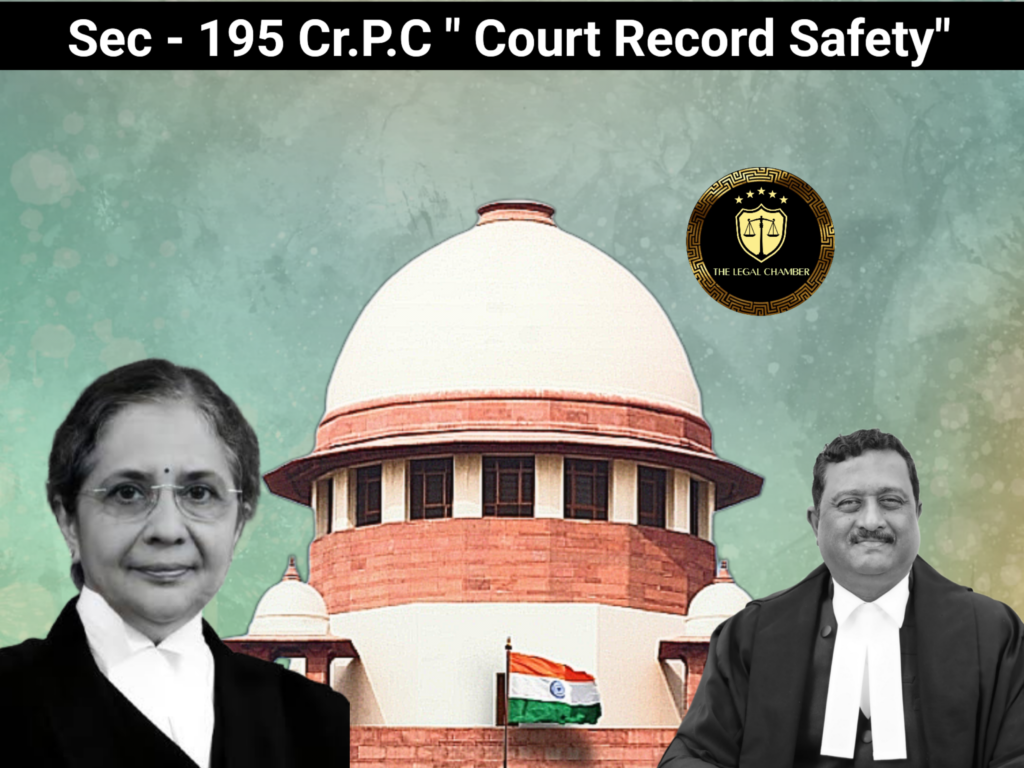
The Supreme Court ruled that Section 195 CrPC does not bar prosecution for tampering with court records after proceedings conclude, as such acts no longer affect “proceedings in court” under Section 195(1)(b). It held that fabricating documents in record rooms post-withdrawal constitutes standalone offences under IPC, not requiring court-sanctioned complaints. The judgment clarified that Section 195 applies only when offences directly impact live judicial proceedings or documents in active court custody, distinguishing between administrative record-keeping and judicial administration of justice. The Court affirmed that FIRs remain valid for post-proceeding forgeries.
Facts Of The Case:
The case originated from a 2005 FIR lodged by the Registrar of Bharuch District Court against Parshottam Chaddarwala and others for tampering with court records. The appellant, acting as a power of attorney holder, had filed Special Civil Suit No. 79/2003 for recovery of Rs. 5.45 lakhs, which was withdrawn unconditionally in 2003 after an out-of-court settlement. Post-withdrawal, the appellant allegedly conspired with court staff to replace original documents (including the withdrawal pursis) with forged ones, creating a bogus decree. Using this fabricated decree, he filed Execution Petition No. 43/2004 in 2004 to illegally recover money. Investigations revealed multiple forgeries: (1) replacement of the withdrawal application with a fake “settlement pursis”, (2) insertion of a bogus decree bearing forged judicial signatures, (3) typewritten reconstruction of the Rojkam, and (4) use of counterfeit court stamps.
The accused allegedly threatened the defendant’s family to extort money. The Gujarat High Court (2009) and Supreme Court (2025) rejected the appellant’s argument that prosecution required court complaint under Section 195 CrPC, holding that tampering with archived records post-case disposal falls outside Section 195’s scope, as it no longer impacts “court proceedings”. The SC upheld the police’s jurisdiction to prosecute such standalone forgeries under ordinary IPC provisions.
Procedural History:
The case began with an FIR (I-C.R. No. 170/2005) filed in 2005 at Bharuch City Police Station against the appellant and court staff for forgery and conspiracy under IPC Sections 192–500. After investigation, a chargesheet was filed before the Chief Judicial Magistrate, Bharuch (Criminal Case No. 14090/2005). The appellant challenged cognizance under Sections 195/340 CrPC, arguing prosecution required court complaint, but the Magistrate rejected this (25.05.2007). The revision plea (Criminal Revision No. 112/2007) was dismissed by the Additional Sessions Judge, Bharuch (24.07.2009).
The appellant then filed Special Criminal Application No. 1690/2009 before the Gujarat High Court under Articles 226/227 Constitution and Section 482 CrPC, which was dismissed on 07.10.2009, holding Section 195 CrPC inapplicable to post-proceeding forgeries. The Supreme Court (Criminal Appeal No. 838/2011) affirmed the High Court’s view on 13.05.2025, ruling that tampering with archived records after case withdrawal falls outside Section 195(1)(b) CrPC’s ambit, allowing prosecution via police FIR.
Read Also: Supreme Court Rejects Delay Condonation in Property Dispute
Court Observation:
The Supreme Court, in its judgment, underscored that Section 195(1)(b) CrPC is not triggered when offences like forgery or document tampering occur after judicial proceedings conclude. It observed that once a suit is unconditionally withdrawn, its records—though preserved administratively—cease to be part of “proceedings in court,” removing them from the protective ambit of Section 195. The Court clarified that such post-disposal manipulations, even if involving court documents, do not affect the “administration of justice” under Chapter XXVI CrPC, as they lack any bearing on live adjudication. Relying on Iqbal Singh Marwah (2005), it reiterated that Section 195 targets offences committed during proceedings (e.g., fabricating evidence for judicial reliance), not archival tampering. The Bench notably highlighted that Section 340 CrPC complaints are unnecessary for prosecuting standalone IPC offences (e.g., Sections 467/471) arising from record-room forgeries, as these fall squarely within police jurisdiction. The judgment thus balanced judicial integrity against frivolous litigation, ensuring offenders cannot exploit procedural bars to evade accountability for post-proceeding frauds.
Final Decision & Judgement:
The Supreme Court dismissed the appeal and upheld the prosecution’s case, ruling decisively that Section 195 CrPC does not bar prosecution for offences committed after judicial proceedings conclude. The Court affirmed that tampering with court records in administrative storage (post-disposal) constitutes standalone offences under general IPC provisions like Sections 467/468/471, prosecutable through ordinary FIRs without requiring a court complaint. It emphasized that Section 195’s protection applies only to documents actively involved in live proceedings, not archived records. The judgment clarified that fabricating documents like the bogus decree in this case – created and inserted into records after the suit’s withdrawal – fell outside Section 195’s scope as it could not impact judicial decision-making. The Court upheld the Gujarat High Court’s view that such post-proceeding forgeries undermine record integrity but don’t affect “administration of justice” under Chapter XXVI CrPC. Notably, it directed that the ordinary criminal process (FIR-chargesheet-trial) was the appropriate mechanism to address such offences, ensuring offenders couldn’t exploit procedural technicalities to evade accountability. The ruling reinforced that Section 195 serves to prevent frivolous litigation over court-related offences, not to shield deliberate frauds on the record-keeping system itself.
Case Details:
Case Title: Parshottam Shantilal Chaddarwala vs. The State of Gujarat & Anr. Citation: 2025 INSC 664 (Supreme Court of India) Criminal Appeal No.: Criminal Appeal No. 838 of 2011 Special Leave Petition (Criminal) No.: Not explicitly mentioned in judgment Date of Judgment: May 13, 2025 Judges/Justice Name: Hon'ble Ms. Justice Bela M. Trivedi & Hon'ble Mr. Justice Prasanna B. Varale
Download The Judgement Here